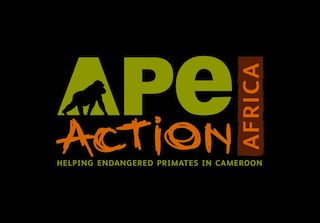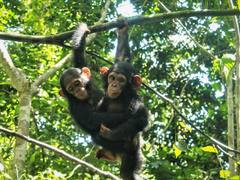Wild gorillas and chimpanzees are on the brink of extinction. Habitat loss and poaching threaten these magnificent animals like never before.
Ape Action Africa is committed to ape conservation in Africa - protecting Cameroon’s great apes through direct action. Our front line conservation work includes rescuing orphaned gorillas, chimpanzees and monkeys, providing them with individual care, and giving them a safe forest sanctuary home where they can live...
All our volunteers live and work at our forest site, Mefou, which is home to more than 100 chimps, 21 gorillas and a whole variety of monkeys, taking the number of animals in our care to over 320. The accommodation is very basic, it is very hot and humid and we expect volunteers to work hard so it's not easy! However, the rewards are fantastic and most of our volunteers have a once in a lifetime experience with the amazing animals in our care.
Our volunteers work with chimpanzees and monkeys alongside our Cameroonian keepers - tasks include preparing food, cleaning overnight satellite cages, making enrichment for the animals, closely observing animal groups for signs of problems. Volunteers may also be involved in construction or repair projects around the park.
We must stress that we cannot guarantee that you will get direct, hands on contact with the animals and our volunteers never work with the gorillas. Our policy is to minimise human contact with the animals because this is much better for their welfare. But even if you do not get the opportunity to hand rear young orphans, you will live and work very closely with them so you will still have a memorable time.
Short Term Volunteer Vets Required
Ape Action Africa has an exciting opportunity for a volunteer veterinarian to work with the resident Cameroon veterinary team.
The role of the vet team includes overall observation and management of primate health following established procedures. Responsibilities include dispensing of medication, immobilizing as necessary for treatment, implementation of disease prevention measures (including parasite checks and treatments) and attending to any medical emergencies. Health checks and close monitoring of newly rescued chimps may also be needed. A key requirement is maintenance of daily data records.




